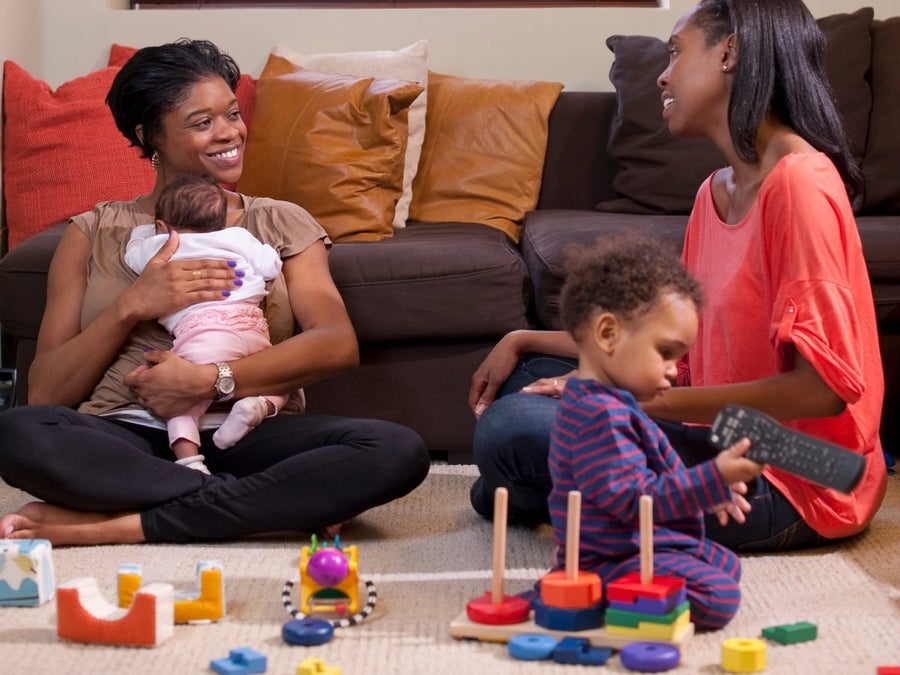Why Birthing Parents Like Me Can’t Wait For Build Back Better To Pass

Giving birth and becoming a parent are significant moments, but the experience can be stressful, particularly for first-time parents. The global public health pandemic made the experience even more challenging to navigate for pregnant people. Anxiety and depression are on the rise for everyone.
Along with prenatal stresses, people who are pregnant have had to confront fears about the impact of the virus on their child/children, limited child care opportunities, and a lack of support because of the COVID restrictions that left many feeling alone.
For people who identify as part of a community of color, LGBTQIA+, or with a disability, figuring out how to prepare for a baby and/or parenthood as well as navigate the health care system while working has been particularly difficult. Before and during the pandemic, they had to confront numerous racist and discriminatory barriers in health care, a lack of access to culturally responsive health care, and a lack of trust in providers.
For Black women, the situation has been particularly dire. Their maternal mortality rate has been unacceptably high, with Black women three times more likely to die from a cause related to pregnancy as compared with white women.
It’s time for us to address parental mental health. We need to start by acknowledging that it exists and that it’s tied to maternal mortality. The Build Back Better legislation incorporates provisions that make this connection. We then need to figure out how to address parental mental health and make certain that all populations have access to prevention and intervention programs. We need culturally responsive outreach programs, and we must promote community-level models that work.
The Build Back Better Act’s investments in health care are an essential step in building a foundation to provide parents with access to care that they may have thought was unimaginable. The Medicaid and maternal mental health provisions in the legislation are significant because they will provide broader access to health services that are critical to parents and will give community-based organizations the federal dollars they need to broaden and expand their existing services.
The Build Back Better Act takes the first step toward linking maternal mental health to maternal mortality. It targets $100 million for programs to address maternal mental health equity where there are high rates of maternal mortality/morbidity or significant racial/ethnic health inequities.
A Commonwealth Fund study shows that, depending on the population and survey tool used, 11-21 percent of pregnant people have perinatal mood and anxiety disorders. The Act also includes support for provider training to recognize maternal mental health conditions and establish new programs with a focus on people of color.
Building a culturally, racially, and gender diverse substance use and maternal mental health workforce is essential to address the need for a culturally responsive health care system. The provisions in Build Back Better will help to reduce glaring inequities in maternal care between people of color and white people. Build Back Better includes $75 million to establish education and training programs for professionals who want to specialize in maternal mental health. The year-long postpartum Medicaid and Children’s Health Insurance Program coverage in every state, previously included in the March 2021 American Rescue Plan Act, would become permanent with Build Back Better. It would entitle Medicaid recipients to full state plan benefits through their pregnancy and postpartum period. The bill would provide $50 million in funding for expanded doula, or birth worker, support before and during labor and allocate $25 million in funds to help providers coordinate maternity care through what are known as maternal health homes. Building up community-based resources and the doula/peer support specialist workforce will help remove barriers to care, build trust between providers and patients, and provide people with more options to feel supported during the stressful time of becoming a parent.
As a first-time expectant parent, I understand the challenges other parents face when trying to access maternal health services. My family has a history of mental health conditions and has faced challenges navigating the health system because of our race/ethnicity. I find myself taking precautions to ensure that I have a network of support, particularly where the health system cannot or will not fill in. However, many pregnant people do not have the resources to ensure that the health care system is as supportive for them as possible.
For parents who have low income and are historically disenfranchised, the related provisions in Build Back Better will provide some relief. At times like these where isolation reigns and support systems are necessary for everyone’s well-being, seeing provisions pass like those mentioned above would be an opportunity for birthing persons to get the support they’ve needed for a long time. The sooner the bill is passed intact, the better it will be for advocates, providers, and most importantly, parents.
Isha Weerasinghe is a senior policy analyst focused on mental health at the Center for Law and Social Policy.

